Wilson: Unfettered access to EU means 'inevitable' border checks between NI and Britain


The DUP is trying to strengthen provisions in the UK Internal Market Act to prevent future checks. However, the East Antrim MP says the Windsor Framework arrangements which give NI access to the EU market makes future checks “inevitable”.
Mr Wilson also says Great Britain’s trading partners will want assurances that unchecked EU goods entering via Northern Ireland don’t pose a threat to their market.
Advertisement
Hide AdAdvertisement
Hide AdHe pointed to a series of food safety concerns in the EU single market – such as recent concern over the antibiotics used in some Polish chicken products and the 2013 horsemeat scandal.
Speaking to the News Letter, Mr Wilson said: "Since Northern Ireland does not have any means of stopping those goods entering Northern Ireland – indeed we are exempt from any of those checks – then the point at which you stop them has to be coming from Northern Ireland. How do you identify those goods? You only identify them by doing checks on all the goods that come from Northern Ireland. And so you get a border which operates in the direction of NI to GB. That’s why I think that until the government addresses the problem of safeguarding Northern Ireland, we are always going to be vulnerable to that.”
The current arrangements – which keep NI effectively in the EU single market for goods – were designed to avoid such checks on the border between NI and the Republic. They have instead created a trade border in the Irish Sea.
The MP said the goods issue is similar to problems the Windsor Framework creates for the Rwanda Bill through the continuing role of the European Court of Human Rights in the province – as it will also “finish up with border checks”.
Advertisement
Hide AdAdvertisement
Hide AdHe added: "It is inevitable that this is going to happen because of the status that they have accorded to us. A status they say gives us a benefit of access to the EU market – but it gives the EU total access to Northern Ireland. Access which the government on occasions may wish to stop the EU having for GB”, Mr Wilson said.
Fundamental changes to the Windsor Framework are not on the table – having been ruled out by both the UK and EU.
DUP leader Sir Jeffrey Donaldson is instead trying to secure changes via the UK Internal Market Act (IMA) and other commitments on NI’s place in the Union. He has asked the government to “both guarantee and future-proof Northern Ireland’s unfettered access to the UK’s internal market in all scenarios”.
However, the IMA is already causing controversy in Edinburgh and Cardiff – where the devolved governments see it as a Westminster power grab.
Advertisement
Hide AdAdvertisement
Hide AdThe IMA currently guarantees that NI goods can be sold in Great Britain – but as a consequence there are no checks on EU goods entering the British market via the province.
This week, the Labour government in Cardiff implicitly rejected the Act’s automatic guarantee that goods coming from Northern Ireland can be sold in Wales. The News Letter asked Cardiff if it had any concerns about EU goods entering the Welsh market via Northern Ireland. They said “EU/Non-UK origin goods should only enter Wales according to our regulatory regime”. The Welsh government also said the “principles and requirements of the UK Internal Market Act do not apply” to Welsh laws – despite losing a legal challenge against the UK government over the issue. However, it appears to be the first time a UK administration has questioned automatic access for goods coming from NI into their market.
In response to the same question, the SNP-led government in Scotland said their ministers “recognise the importance of protecting Scotland’s businesses and consumers by delivering high standards and biosecurity protections and therefore urge the UK Government to maintain alignment with the EU on these matters”.
The DUP also wants to ensure that goods moving in the other direction – from GB into NI – should not be subject to EU “customs processes”, and that “save for animal health and the risk of smuggling” there should not be checks on goods.
Advertisement
Hide AdAdvertisement
Hide AdThe Ulster Unionist Party have expressed enthusiasm for the “enormous opportunity” EU market access gives – and proposed a UK trade body to “support and improve our position within the UK internal market”.
Comment Guidelines
National World encourages reader discussion on our stories. User feedback, insights and back-and-forth exchanges add a rich layer of context to reporting. Please review our Community Guidelines before commenting.